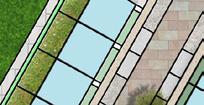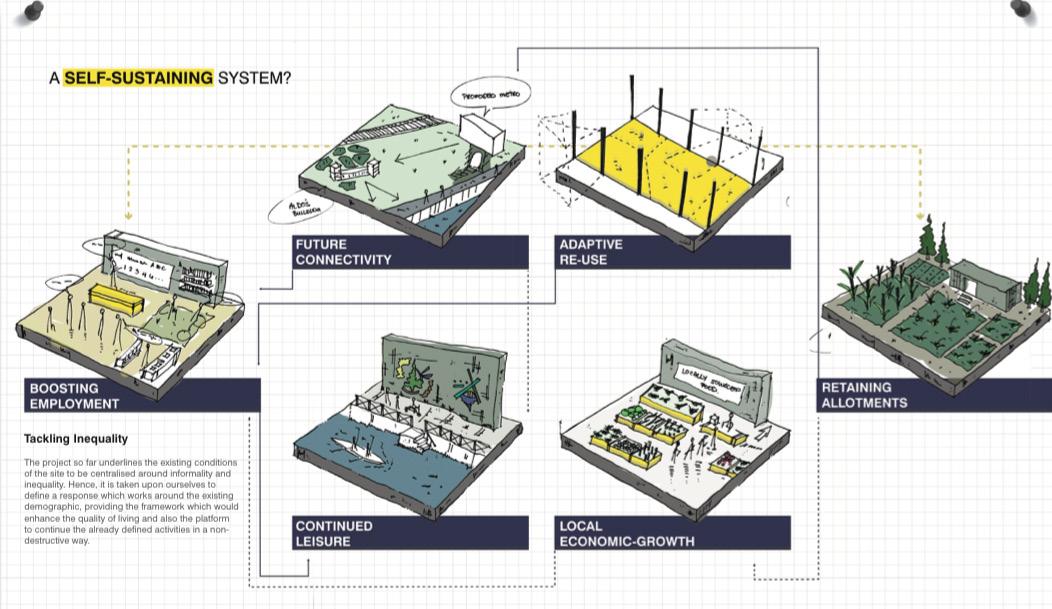P T L O F I R O O
Housing Alternatives: Middlesbrough Proposal
STUDIO MASTER’S PROJECT
NEWCASTLE UNIVERSITY
GRADE: HIGH DISTINCTION






7 Design Strategies for Middlesbrough Proposal f to Right)
Community gardening, Preservation of listed buildings, Passive surveillance Common house facilities, Play facilities, foliage and vegetation Connectivity by layout
“Integrating the elderly into the scheme creates an intergenerational community. Tis increases passive surveillance, deterring anti-social behaviour and making the community safer.”
Contextual application of Co-Housing
It afordable natural and the high percentage of afordable housing provided will meet below average salary and house price demographics.
Lack of community and safety concerns, highlighted in interviews, will be addressed by communal facilities bringing people together and housing positioned to increase natural surveillance.
Establishing a community will reduce loneliness and isolation and enhance the sense of belonging, tackling the high levels of mental health cases in Middlesbrough.
Community facilities are incorporated aimed at meeting the needs of the people.
Contextual Application of Model of Care
addressing the safety and anti-social behaviour concerns highlighted in interviews.
As ageing population starts to dominate the housing market and becomes an added key players for housing competition, providing accomodations will cater the housing shortages
in the NE thus attracting elderly people into the local economy.
Ofering variety of contemporary housing typologies will raise aspirations for older generation and challenges the stigma of institutionalised housing and meeting local demand.
Using the 10 HAPPI recommendation as a guidline will provide homes that steers away from conventional norms of senior housing.

Linking both Co-housing and New Models of Care
Te social nature of both schemes can help integrate elderly people into a community and reduce issue of isolation which are especially prevalent in the ageing community.
Co-housing can integrate co-care and co-support to support the elderly residents in the community.
Integrating the elderly into the scheme creates an intergenerational community. Tis increases passive surveillance, due to people being in the community at all times of day, deterring anti-social behaviour and making the community safer.
Masterplan with local context such as surrounding housing and vegetation.
stories co housing fat
stories co housing common house single story bungalow for ageing 4 stories fats for ageing 4 stories care home facilities sport facilities/pitch/playground
Dwellings: 651 units







type 2 listed buildings
community garden/allotments
lawn
native wild fowers
tarmac and parking space
shared space cars and pedestrians P.O.S
walkpath and cycling routes
Mixed: Cohousing: (1 bed A=40, 1 bed B=40, 1 bed C=40. 1 bed D=30, 1 bed E=40 ), (2 bed fat= 40) , ( 3 bed terrace= 53, 3 bed end terrace = 30)
Ageing: (Flats :1 bed=91, 2 bed=143, 3 bed=40, 4 bed=27) (terraced: 2 bed=37)
Use: Common house, guest rooms, communal kitchen, event space, sports facilities allotments and gardens community gardens
Density: 54 dph
No. of carspaces: 670 spaces
% of open space: 17%
% of allotments: 0.19%






View

in the green corridor including ageing bungalows and cohousing fat
Tis part of the green corridor acts as a key connection to the existing green space opposite on Durham Street. Tis will be a key draw point to attract people into our site.

View
towards the town hall showing vegetation and parking spaces

Tis view emphasises the importance of town hall in our site. Tis townhall is a listed building that reminds the historical past of the area. Tis will be redevelop into new

View looking down the green corridor including co housing
Tis is the heart of our site with the green corridor leading up to the town hall. range of outdoor activities and aims to incourage physical activitiy and access to green space which is proven to improve people’s mental health. T









Cities and Culture: Train station in San Cristoforo, Milan
STUDIO MASTER’S PROJECT
NEWCASTLE UNIVERSITY
GRADE: HIGH DISTINCTION

6 Design Strategies for design proposal
“we tackle these issues with a framework rather than a concrete scheme, which is only suggestive and leaves much of the design responsibility to the client”
To appreciate Aldo Rossi position as a postmodernist, one must really appreciate his stance as anti-modernist. His vision was for an architecture which was untainted by a project of capital and an architecture defnitive of its own intrinsic moment in history, unfettered by an external past. Alternatively with the job unfnished we are lef with the task of defning the site in its existing, revised
conditions to which we will brush them with the term ‘Informality’.
GLI INFORMALI
In visiting the site frst-hand, the demographics became clear to us as the homeless, agriculturalists and small, but growing arts community. Te site itself sits on the rural-urban fringe of Milan, local housing developments suggest the urban sprawl of the centre, yet our fndings suggest there is so far no response to support the economically challenged in the area – one must question the availability of the existing housing methods and their appropriateness for San Cristoforo.
In response, we tackle these issues with a
framework rather than a concrete scheme, which is only suggestive and leaves much of the design responsibility to the client, employing a high level of self-citizen participation to be delivered over a 10 year plan. Te initial interventions focus on establishing a workshop within the existing structure, these will be tailored to manufacture mainly temporary living units for those without a home, but simultaneously construction skills will be applied to boost employment opportunities for those same individuals.
Te adaptive re-use of the Rossi Building intends to trigger the peripheral interventions around the site which further support the existing demographic; Allotments will be given

new commercial outlets through market interventions within the structure, enhancing the local economy through participatory engagement with existing communities. Sustainability is considered through the production of bio-fuel from agricultural waste, in turn establishing a small self-sustaining system at the heart of the 3 districts: Milan, Buccinasco & Corsica. Finally, artist’s are given the platform and facilities to continue practicing in a non-destructive way.
Site masterplan of the entire trainstation




Ground foor plan of the building Assembly


Rooms can be extended forward during construction Technical details and room layouts Workshop layout



